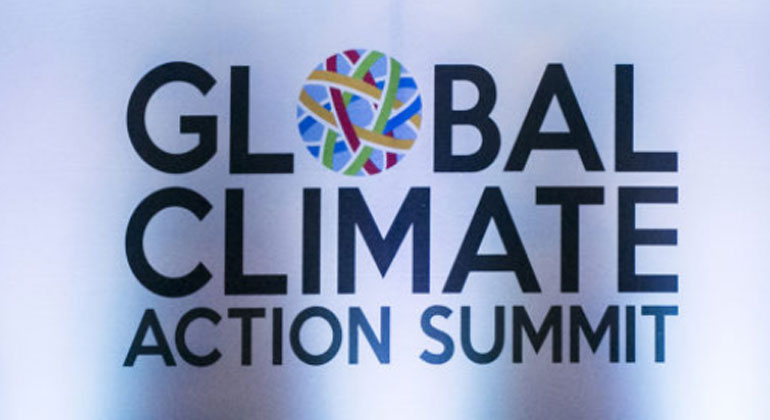National Governments urged to step up climate action by 2020 at end of Landmark Summit
A major international summit ended in California with delegates calling on national governments to join forces to step up climate action ahead of 2020—the year when global greenhouse gases need to peak and fall sharply thereafter to avoid the worst impacts of climate change.
The meeting of leaders from states and regions, cities, business, investors and civil society at the Global Climate Action Summit (GCAS) underlined the transformational action they are already pursuing.
Over 100 leaders, for example, are now committed to carbon neutrality—or removing as much carbon dioxide from the atmosphere as they emit with the Governor of California bringing the date forward for his state achieving this to 2045.
Leaders also unveiled a range of bold new commitments across five specific challenge areas aimed at taking their collective ambition to the next level. These are aimed at avoiding risks and seizing the opportunities outlined in a suite of reports including the new Unlocking the Inclusive Growth Story of the 21st Century by the New Climate Economy.
It finds that a stepped-up transition to a low-carbon economy can:
- Result in $26 trillion in economic benefits worldwide through 2030.
- Generate over 65 million new low-carbon jobs in 2030, equivalent to today’s entire workforces of the U.K. and Egypt combined.
- Avoid over 700,000 premature deaths from air pollution in 2030.
- Generate, through just subsidy reform and carbon pricing, an estimated US$2.8 trillion in government revenues per year in 2030—equivalent to the total GDP of India today—funds that can be used to invest in other public priorities or reduce distorting taxes.
- By a shift to more sustainable forms of agriculture combined with strong forest protection, deliver potentially more than US $2 trillion per year of economic benefits, generating millions of jobs, improving food security—including by reducing food loss and waste—and delivering over a third of the climate change solution.
- By restoring natural capital, especially our forests, degraded lands and coastal zones, strengthen our defenses and boost adaptation to climate impacts, from more extreme weather patterns to sea-level rise.
The announcements during and prior to the Global Climate Action Summit are helping realize this promise that will in turn support the achievement of the Paris Climate Change Agreement now and over the years and decades to come.
Governor Edmund G. Brown Jr of California, and a Summit co-chair said, “This week, cities, states, businesses and non-profits stepped up and took strong action at the Global Climate Action Summit. Now it’s time to take this momentum back home. Climate change waits for nobody. Let’s get to work.”
Healthy Energy Systems
An alliance of more than 60 state/regional, city governments and multinational businesses are now committed to a 100% zero emission targets through the ZEV Challenge.
- 12 regions – including Catalonia, Lombardy, Scotland, and Washington State, representing over 80 million people and over 5 percent of global GDP will have 100 per cent zero emission public fleets by 2030.
- 26 cities with 140 million people are committed to buy only zero emission buses starting in 2025 and creating zero emission areas in their cities starting in 2030.
Business is stepping-forward with 23 multinational companies in EV100, with revenue of over $470 billion, committed to taking fleets zero emission.
- IKEA Group will transition to EV in Amsterdam, Los Angeles, New York, Paris, and Shanghai by 2020 – to reach 100% zero emissions for last mile home delivery.
- More than 3.5 million additional zero emission vehicle charging points will be installed by 2025, and a goal for transport hydrogen to be zero-emissions by 2030 was launched
Almost 400 global companies along with health care providers, cities, states and regions now have 100% renewable energy targets.
- This includes nearly 150 major global companies such as Tata Motors and Sony who have joined the RE100 initiative: collective annual revenues of these companies total well over US $2.75 trillion and their annual electricity demand is higher than that of Poland.
- Over 30 energy intensive industry and property players have set smart energy and net zero carbon buildings targets through EP100.
Inclusive Economic Growth
488 companies from 38 countries have adopted emission reduction pathways in line with the science of the Paris Agreement—up nearly 40 per cent from last year.
- Nearly a fifth of Fortune Global 500 companies have now committed to set science-based emissions reduction targets including big emitters like India’s Dalmia Cement
- As one example, Levi Strauss & Co. has an approved Science Based Target for a 90 per cent reduction in emissions in all owned-and-operated facilities and 40 per cent reduction in its supply chain by 2025.
- Collectively these more than 480 companies represent $10 trillion of the global economy, equivalent to the value of the NASDAQ stock exchange.
At the Summit, 21 companies announced the Step Up Declaration, a new alliance dedicated to harnessing the power of emerging technologies and the fourth industrial revolution to help reduce greenhouse gas emissions across all economic sectors and ensure a climate turning point by 2020.
- Signatories include several established climate leaders: Akamai Technologies, Arm, Autodesk, Bloomberg, BT, Cisco Systems, Ericsson, HP, Hewlett Packard Enterprise, Lyft, Nokia, Salesforce, Supermicro, Symantec, Tech Mahindra, Uber, Vigilent, VMware, WeWork, Workday, and
- Companies Autodesk, Safaricom and Unilever became the first to join a new Pledge for a Just Transition to Decent Jobs. They pledged to only buy from renewable energy providers that uphold fundamental workers’ rights including social protections and wage guarantees.
Sustainable Communities
Over 70 big cities, home to some 425 million citizens, are now committed to carbon neutrality by 2050, including Accra, Los Angeles, Tokyo and Mexico City.
- These actions alone will lead to a 2.5 percent cut of annual global greenhouse gas emissions and the avoidance of 12 billion tonnes of carbon dioxide equivalent by 2050.
A further 9,100 cities representing 800 million citizens are now committed to city-wide climate action plans.
This could lead to reductions of more than 60 billion tonnes of carbon dioxide equivalent between now and 2050.
- Mayors of over 70 of the world’s key cities reaffirmed their commitment to delivering on the highest ambitions of the Paris Agreement, namely to keep a global temperature rise to below 1.5℃. .
Cities are getting the job done, with other new city commitments that have put key cities on the path towards zero waste, to significantly cut greenhouse gas emissions in new and existing buildings; and to deliver inclusive climate action that benefits all citizens equitably.
- During the maiden voyage of the San Francisco Bay Area’s first plug-in hybrid electric ferry, Governor Edmund G. Brown Jr. signed a comprehensive package of bills aimed at dramatically reducing carbon emissions by boosting the number of zero-emission vehicles and charging stations in California and getting dirty cars and trucks off the road.
- Meanwhile Starbucks, as one example, announced that by 2025 the company will have 10,000 Greener Stores globally, encompassing existing stores and new stores and renovations.
Land and Ocean Stewardship
A powerful Leaders Group and a new alliance linking over 100 NGOs, businesses, state and local governments, indigenous groups and local communities was launched to fire up action across the forest, food and land agendas.
- Over 100 global supply chain actors including supermarket chain Tesco and investors–managing over US $5.6 trillion–pledged to work with a variety of organizations to halt deforestation and native vegetation loss in the Cerrado, Brazil.
- Walmart announced a new platform to identify high-risk jurisdictions and source palm oil and paper and pulp from jurisdictions with no deforestation. As an example, Unilever – an anchor partner and supplier to Walmart – will support farmer certification as well as restoration in the Sugut, Kinabatangan and Tawau river basins in Sabah, Malaysia.
- Ecuador’s Inter-institutional Committee on Sustainable Palm Oil seeks to balance economic growth, productivity, and forest conservation and preservation. To achieve this, the Committee will work towards increasing production of palm oil on existing cultivation areas, by implementing sustainable agricultural practices based on national legislation and international standards, including the Roundtable for Sustainable Palm Oil (RSPO); thus, decreasing pressure on remaining forests in the country and strengthening the capacities of smallholder producers on sustainable management. These combined actions will contribute to Ecuador’s advancement in the fight against deforestation, using a jurisdictional sectoral approach, with a vision towards reducing and eliminating deforestation from palm oil production in the Amazon by 2025, as well as achieving zero deforestation from the sector by 2030, nation-wide
- Through the Pacific Coast Collaborative, states and cities on the United States’ West Coast committed to reduce food loss and waste by 50% by 2030, a commitment with the potential to reduce 25 million tons of GHG emissions per year from the often-overlooked food sector.
- The Global Environment Facility announced $500 million in funding to drive improved land use and forest conservation.
- Nine of the world’s leading philanthropic foundations announced their intent to commit at least $459 million through 2022 to the protection, restoration and expansion of forests and lands worldwide—the announcement underlined indigenous peoples’ and traditional communities’ collective land rights and resource management.
- Coral Vita announced it would be collaborating with Mote Marine Lab and Gates Coral Lab to commercialize innovative, resiliency-driven, and super-fast growing methods of ‘coral farming’ to replace dead and dying ones in the Caribbean. The pilot will be in Grand Bahama and then extended to other countries in the region and the world.
- An initial $1 million public-private partnership between the office of US Senator Brian Shatz of Hawaii and NOAA, the National Fish and Wildlife Foundation and Marc and Lynne Benioff was announced to support monitoring and research at the Papahānaumokuākea Marine National Monument.
Transformative Investments
The Investor Agenda was formally launched bringing together nearly 400 investors managing US $32 trillion of assets including CalPERS, the largest US pension fund; La Caisse de dépôt et placement du Québec (CPDQ), Danish pension fund PKA, and Sumitomo Mitsui Trust Asset Management.
It means that investors with assets more than a third larger than the economy of the United States are now firmly focused on accelerating and scaling-up financial flows into climate action and building a more sustainable, low-carbon, global economy.
- CDPQ, Canada’s second largest pension fund has, for example, committed to increase its low-carbon investments by 50% by 2020, representing more than US$6.2 billion in new investment, and pledged to reduce the carbon intensity of its portfolio by 25% by 2025.
- PKA, Denmark’s labor market pension fund manager, announced it plans to increase its investments in low-carbon climate solutions to 10 percent of its assets.
- APG, the Dutch pension fund manager, announced it would no longer be investing in any coal related infrastructure going forward.
- New York City announced it would be doubling its investments in clean energy and climate solutions to $4 billion over the next three years.
296 investors have now joined Climate Action 100+ which is working with some of the highest emitting companies to assist them in lowering emissions, getting on track with clean energy and the goals of the Paris Agreement.
- The Green Bond Pledge announced founding signatories including the City of Mexico, Luxembourg Green Exchange and SFPUC who join the state treasurers of California, New Mexico and Rhode Island; some major cities including the City of San Francisco; Australian pension fund LGS and two financial firms —which together should spur the goal of seeing US $ 1 trillion-worth of green bonds issued by end 2020.
- A Global Green Bond Partnership, (GGBP) backed by the World Bank, International Finance Corporation, Amundi and major climate finance and sustainability groups was launched with the aim of supporting and assisting sub-national and corporate green bond issuance.
- 42 financial institutions gathered under the mainstreaming Climate Action in Financial Institutions initiative, representing over $13 trillion in assets, announced a commitment to helping cities, states, and regions finance climate action, including Multilateral Development Banks, members of the International Development Finance Club as well as leading private financial institutions from developing and developed countries.
At the end of the final plenary, Governor Edmund G Brown Jr announced that California would be developing its own climate change pollutant-monitoring satellite in partnership with San Francisco earth-imaging company Planet Labs.
Call to Global Climate Action
The news came as delegates issued the Summit’s Call to Global Climate Action:
“We, the people gathered at the Global Climate Action Summit, and communities around the world calling for climate action, commit to a climate-safe future for all.”
“Now is the time for all leaders to step up and take bold action. Climate change is a threat to all humanity, and it can only be solved by a global cooperative effort. Only together will we transform our communities and energy systems, create employment opportunities and economic prosperity, protect our oceans and natural environment, and complete the transition to a zero-carbon world.”
“We call on the national governments of the world to: Step-Up Ambition Now including in the form of enhanced Nationally Determined Contributions (NDCs) by 2020, consistent with what science tells us is needed to achieve the goals of the Paris Agreement Now; Chart a Clear path to your Zero-carbon future and Empower Bottom-Up Climate Action,” it says.
Patricia Espinosa, Executive Secretary of UN climate change and Summit co-chair, said: “This Summit and its Call to Action make an important contribution towards achieving our collective goal: to keep global temperatures to 1.5 degrees Celsius in line with the Paris Agreement. It will encourage governments worldwide to step up their actions, demonstrating the vital role that states and regions, companies, investors, and civil society are playing to tackle climate change.”
Anand Mahindra, chairman of the Mahindra Group and Summit co-chair, said: “The coming together of businesses, cities, states and regions at the GCAS has demonstrated the momentum that is needed to step up action on climate change. It has shown that the world doesn’t need to wait. Leaders the world over need to be authentic, committed and need to re-inspire people to follow this path. Acting on climate is at the core of the Mahindra Group, It is for this reason that I have extended my pledge that the entire Mahindra Group will become carbon neutral.”
Xie Zhenhua, Special Representative for Climate Change Affairs of China and Summit co-chair, said: “China will 100% achieve its Paris commitment”
UN Development Programmes Goodwill Ambassador and Danish Game of Thrones actor Nikolaj Coster–Waldau and Aidan Gallagher, UN Environment Youth Advocate and American actor in the Netflix series The Umbrella Academy, were also asked to help take the Call and Outcomes to the American people and people around the globe via social media.
Both celebrities are supporting the New American Road Trip—a journey across the United States by electric car from San Francisco to New York where it is planned to hand over the document to leaders at the One Planet Summit, convened by President Macron of France, on Sept. 26 during the annual Climate Week.
For a chronological, full list of announcements – please click here








